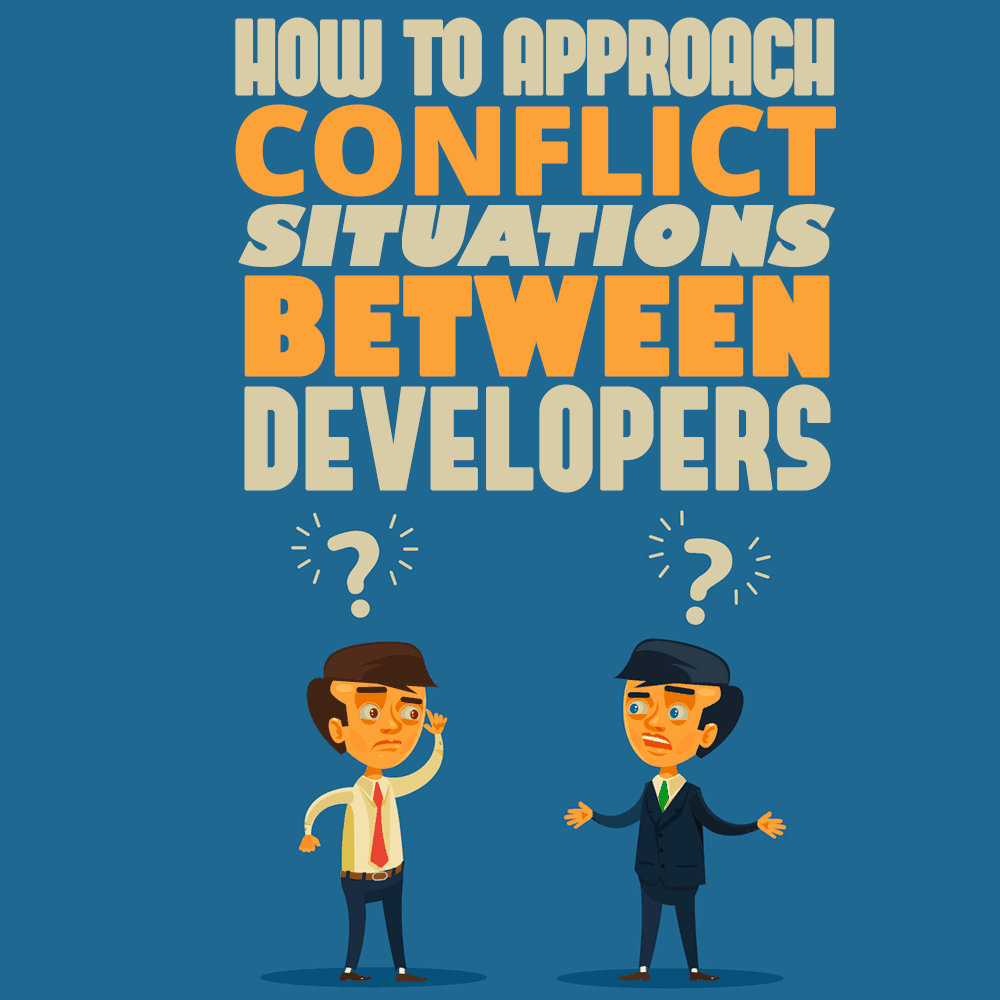
In the IT Industry, all products are developed by teams. The team concept has existed for a long time, often consisting of at least a few team members and at least one team lead who guides the process in the right direction. Having a collective team focus during the work process and increased productivity are just two perks of working on a team.
However, when multiple people work on the same project, it creates many opportunities for friction between colleagues. It is natural for conflicts to occur considering the clash of personalities and points of view. While you cannot moderate your colleague’s behavior, you can most definitely adapt your own to handle conflicts in the best way possible to defuse a negative situation.
Before we move on to tips for reacting in argumentative situations, we need to establish something very important right off the bat:
“Peace is not the absence of conflict, it is the ability to handle conflict by peaceful means.”
– Ronald Reagan
Conflict can take the form of having a different vision of how the product should be developed. If addressed respectfully and open-mindedly, you can turn it into a challenge of understanding each other and finding common ground to work through conflicts. You will be surprised how this will, in turn, benefit the project, generating great and unexpected results.
So, automatically charging to defend your position will definitely not do you any favors. Instead, be open to a compromise that can even lead to a more successful project than you expected.
In addition, you don’t want to gain a reputation for being stubborn, defensive, and overall difficult to work with. This may end up getting you excluded from future decision-making discussions and actively reduce your professional value in the eyes of your colleagues and superiors. Being someone whose opinion is taken into account for its value is an invaluable experience that you do not want to miss out on.
Keeping all of that in mind, the key to holding your ground in a professional manner lies with understanding different types of conflicts, what causes them, and what the reasoning behind them is.
Interpersonal Conflicts in a Software Development Environment
From my experience working for a bespoke software development company, it is expected that when working on a team, you might come across some more than unpleasant co-developers.
They may be perfectly competent in their work but unintentionally end up being disrespectful to their colleagues. Both the added pressure of work stress and deadline fatigue could potentially serve as catalysts for people’s bad behavioral patterns to come out.
In fact, according to a study released by the American Institute of Stress, the effects of stress in the workplace can be so difficult to cope with that 2% of the people who participated in the research admitted to having actually struck a colleague, and 29% admitted to having yelled at another employee in the workplace.
When it comes to the IT Industry, it is generally expected for developers to be professional and respectful of other team members they work with. In many cases, development companies tend to have higher than average standards when it comes to workplace conditions and systems for addressing such incidents.
However, conflicts do still occur—whether they are about a difference of opinion when it comes to tackling a project or letting the stress affect their manners, there will still be those who act badly. This is why you need to be prepared to respond to people who push past the professional boundaries, regardless of whether it was intentional or not.
Dealing With Being Approached Disrespectfully
There are many common reasons for conflict between developers. More often than not, conflicts arise from not seeing eye to eye on which approach is best. However, there are occasions when these conflicts push the boundaries of professional difference of opinion and turn into personal attacks.
The difference between constructive discussion and disrespectful conflict is in the approach to communication. If the person is respectful while challenging your professional opinion, then a solution could result from the ordeal.

If, however, they start making remarks on a personal level—targeting your professional competence and intelligence or even your personal qualities that are irrelevant to the topic at hand—then it is likely the person is blowing up at you for other, unrelated, reasons. This may be due to stress, or they could even be looking for conflict on purpose. While the latter is more rare than any other reason, it happens when the person you are dealing with is more confrontationally wired and thrives in the workplace due to putting their colleagues in situations that makes them look bad.
The most important thing to do in this situation is to stay calm and collected. Attempt to guide the conversation back to the main issue. Ask questions such as:
“Why do you think this method is not appropriate?”
or
“What do you suggest we do instead?”
or
“How do you think we can change the solution to incorporate it into the other segments of the code and the project?”
Doing this might surprise them—people rarely react to personal attacks with questions posed to understand the opposing position. Being taken aback, the disrespectful person will soon realize how inappropriate their behavior is and modify it to be more professional.
Part of the conflict may also come from a place of misunderstanding. Asking these questions allows them to clear up any gray areas and badly relayed information. If that is the case, then you have the chance to clear up any misinformation right away.
On the occasion that this approach is not effective, and they continue insulting you or yelling at you, you can attempt to tell them, calmly, that the way they are talking to you is disrespectful and unprofessional. You can also add that if they want to discuss an approach they believe is better-fitting, they will have to moderate their tone and focus on the topic at hand. You should warn them that if they do not, you will have to report their behavior to HR.
Being Called Out in Front of the Team
Feedback on your work should always be appreciated and accepted—it is a great way to increase your competence and evolve to be a more well-rounded professional. This applies not only to feedback that comes from management and more experienced developers but also from other developers on the same professional level.
You might be surprised to hear about something you did not realize you were doing that is holding you back in your work. Or you might find out that they can suggest an easier, better, or quicker way to do things. And that’s great!
One thing that is frowned upon, however, is calling out a colleague in front of the team for making a mistake. If that happens to you, there are a few possible reasons why someone would choose this particular approach in a professional setting:
They scolded you in public on purpose. There are people who think humiliating you will push you in the right direction. On that rare occasion, they may think that making you look bad will somehow further their own career.
One of the best ways to respond is to stay calm and unaffected. Ask them if they want to arrange a meeting, provided they think there is something you need to discuss and improve upon that could help the team move forward.
On the occasion it was an aggressive remark for the sake of conflict, they will most likely not take you up on your offer, thus coming off as immature and unprofessional instead of making you look bad. If they do accept your meeting invitation, hear them out calmly and respond as you see fit according to the situation at hand.
They did not realize they were putting you in an uncomfortable situation. We all know people who are a bit too quick to run their mouths. It is possible that they intended saying this as something that could help you and your work but accidentally chose a wrong approach that had the opposite effect.

If this is the case, you will most likely pick up on it by their reaction when they realize how their words were perceived, or you will be able to get that impression based on previous observation of their other interactions with people.
They may blush, or show signs of feeling uncomfortable, or pull you aside to talk for a bit. Sometimes, they may apologize for putting you on the spot. Other times, they will simply go on talking to you but in an obviously nonaggressive way, seeming to come from a place that shows they want to help you do your work better.
If that is the case, then it would be good to keep your mind open to what they might be trying to tell you—your work could probably benefit from it. More often than not, this is something that comes from someone who is trying to be helpful but approached the situation in the wrong way.
They attempted to talk to you about this in private a few times, but you did not acknowledge or address it. This may happen on the occasions where the change is important to your own and the team’s work process. If you are holding the team back but are not making an attempt to resolve the issues on your end, it is possible they felt it was the only way to get your attention and make you change the way you work. In that particular scenario, you should not be acting like a victim, especially when their concerns are valid or something your management team attempted to address as well.
Having to deal with people questioning your quality of work publicly can be very upsetting. And it is understandable how this could make you feel a range of emotions—from sad to humiliated to angry. But letting your emotions control your actions will do nothing but cause your colleagues to question your professionalism.
As a developer, your logical thinking and problem-solving approach are a part of your personality. This is the best time to lean on that aspect of your skillset and attempt to understand the situation before blowing up and being quick to respond.
Adapt Your Behavior To Handle Conflicts Without Escalating Them
As you can tell, the most important piece of advice whenever dealing with professional conflict is fairly simple: Stay calm and try to understand why the other person is approaching you as they are. Do the following:
- Try to listen to what they are saying, detaching yourself from their tone and approach.
- Analyze the reasoning behind their thought process—people are rarely rude simply out of spite.
- Hold your ground without being argumentative and disrespectful—remaining professional is the best way to come out of the conflict without hurting your image in front of your team.
Understanding their motives will help you greatly to come out of the situation without damaging your image as a professional.
Yelling, throwing tantrums, and complaining to other colleagues should be very obvious reactions to avoid. Each of those reactions will make you look immature and quite unable to take criticism and advice—yes, even if you were approached in a wrong, aggressive, and disrespectful manner, you still must present yourself in a professional manner.
While it is true you cannot modify other people’s behavior, you can modify your own.
Knowing how to respond when approached aggressively at work by other developers or even management will help you have calmer interactions with them. It will help you build a working professional relationship that is significantly less stressful in the long run.
